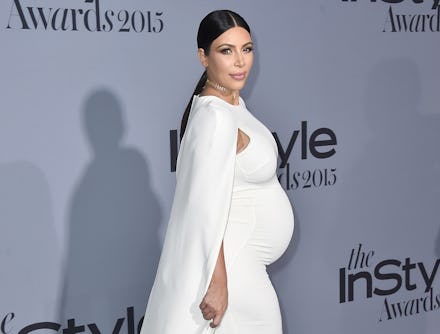No, Kim Kardashian West, It's Probably Not an Awesome Idea for You to Eat Your Placenta

After giving birth to her son Saint West on Dec. 5, Kim Kardashian West has decided to stay off her feet and chill at home for a little R&R, just as a normal mother would do.
Just kidding. She's ingesting her afterbirth in pill form.
In a blog post aptly titled "Eating My Placenta" that appeared (behind a paywall) on her blog Monday, Kardashian West explained her decision to consume her placenta, which caused complications during her second pregnancy, in order to gain energy and stave off postpartum depression.
Following in the footsteps of other celebrity moms like January Jones and Kim's own sister, Kourtney, the reality TV star had the organ dried out and turned into a powder by a company that specializes in making placenta capsules.
"I heard so many stories when I was pregnant with North of moms who never ate their placenta with their first baby and then had postpartum depression," Kardashian West wrote, "but then when they took the pills with their second baby, they did not suffer from depression! So I thought, why not try it? What do I have to lose?"
Indeed, what does Kardashian West have to lose by eating an organ specifically meant to provide nutrients to a developing fetus? According to Dr. Pratima Gupta, an OB-GYN at Kaiser Permanente and a fellow at Physicians for Reproductive Health, the answer is: Maybe nothing! But it still might not be the best idea.
"As far as we know, there aren't any benefits, but there are also no harms," Gupta told Mic. "The purported benefits vary from people saying they notice less postpartum depression to it giving them energy. The placenta does have hormones during pregnancy, [but after] the preparation process for encapsulation... it wouldn't really have any of the remaining hormones in it."
What placenta pills might have is iron, said Gupta, but that means "a lot of the benefits could be received from taking an iron supplement as well." She does not recommend consuming placenta, in part because preparation of the organ isn't regulated and therefore varies from company to company. (The Food and Drug Administration, for instance, has cracked down on some placenta sellers, with Florida state authorities raiding a Miami birth center that was accused of selling unregulated placenta pills in 2008.)
"Like any medical tissue, if it isn't prepared properly, a patient could get sick if there were any sort of infection or anything like that," Gupta said.
Research on the effects of consuming one's own placenta, whether beneficial or detrimental, is limited, and a recent literature review found no real consensus on whether the practice is good or bad. While one study found the organ might contain a compound that has pain-relieving effects, other researchers have discovered harmful substances like mercury and lead in human placenta.
"There really are no human studies based on today's scientific standards to actually show as evidence for human effects, and the animal studies aren't translating into human benefits," Cynthia Cole, the author of the review, told the Atlantic.
In other words, doctors and scientists aren't sure what's in a woman's placenta, nor can they be sure how it's prepared for consumption.
Hopefully, Kardashian West will be fine ingesting pills made from the powder of her own innards. It's possible that they might even make her feel great! But there's no proof either way whether eating your own placenta is good or bad for you, so new moms: Just, like, don't do it, OK? OK.